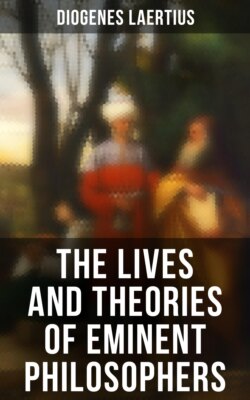Читать книгу The Lives and Theories of Eminent Philosophers - Diogenes Laertius - Страница 31
На сайте Литреса книга снята с продажи.
LIFE OF EPIMENIDES.
ОглавлениеTable of Contents
I. Epimenides, as Theopompus and many other writers tell us, was the son of a man named Phædrus, but some call him the son of Dosiadas; and others of Agesarchus. He was a Cretan by birth, of the city of Gnossus; but because he let his hair grow long, he did not look like a Cretan.
II. He once, when he was sent by his father into the fields to look for a sheep, turned out of the road at mid-day and lay down in a certain cave and fell asleep, and slept there fifty-seven years; and after that, when he awoke, he went on looking for the sheep, thinking that he had been taking a short nap; but as he could not find it he went on to the field and there he found everything changed, and the estate in another person’s possession, and so he came back again to the city in great perplexity, and as he was going into his own house he met some people who asked him who he was, until at last he found his younger brother who had now become an old man, and from him he learnt all the truth.
III. And when he was recognized he was considered by the Greeks as a person especially beloved by the Gods, on which account when the Athenians were afflicted by a plague, and the priestess at Delphi enjoined them to purify their city, they sent a ship and Nicias the son of Niceratus to Crete, to invite Epimenides to Athens; and he, coming there in the forty-sixth Olympiad, purified the city and eradicated the plague for that time; he took some black sheep and some white ones and led them up to the Areopagus, and from thence he let them wherever they chose, having ordered the attendants to follow them, and wherever any one of them lay down they were to sacrifice him to the God who was the patron of the spot, and so the evil was stayed; and owing to this one may even now find in the different boroughs of the Athenians altars without names, which are a sort of memorial of the propitiation of the Gods that then took place. Some said that the cause of the plague was the pollution contracted by the city in the matter of Cylon, and that Epimenides pointed out to the Athenians how to get rid of it, and that in consequence they put to death two young men, Cratinus and Ctesibius, and that thus the pestilence was put an end to.
III. And the Athenians passed a vote to give him a talent and a ship to convey him back to Crete, but he would not accept the money, but made a treaty of friendship and alliance between the Gnossians and Athenians.
IV. And not long after he had returned home he died, as Phlegon relates in his book on long-lived people, after he had lived a hundred and fifty-seven years; but as the Cretans report he had lived two hundred and ninety-nine; but as Xenophones the Colophonian, states that he had heard it reported, he was a hundred and fifty-four years old when he died.
V. He wrote a poem of five thousand verses on the Generation and Theogony of the Curetes and Corybantes, and another poem of six thousand five hundred verses on the building of the Argo and the expedition of Jason to Colchis.
VI. He also wrote a treatise in prose on the Sacrifices in Crete, and the Cretan Constitution, and on Minos and Rhadamanthus, occupying four thousand lines.
VI. Likewise he built at Athens the temple which is there dedicated to the venerable goddesses, as Lobon the Augur says in his book on Poets; and he is said to have been the first person who purified houses and lands, and who built temples.
VII. There are some people who assert that he did not sleep for the length of time that has been mentioned above, but that he was absent from his country for a considerable period, occupying himself with the anatomisation and examination of roots.
VIII. A letter of his is quoted, addressed to Solon the lawgiver, in which he discusses the constitution which Minos gave the Cretans. But Demetrius the Magnesian, in his treatise on Poets and Prose writers of the same name as one another, attempts to prove that the letter is a modern one, and is not written in the Cretan but in the Attic dialect, and the new Attic too.
IX. But I have also discovered another letter of his which runs thus:—
